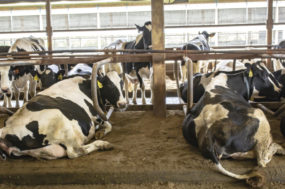On Tuesday, June 2, the Food and Drug Administration (FDA) published the final version of the Veterinary Feed Directive (VFD). The rule dictates that antimicrobials used in animals for food production must be given under the supervision of a veterinarian.
"Once these changes are fully implemented, it will be illegal to use these medically important antibiotics for production purposes, period," wrote the FDA deputy commissioner for foods and veterinary medicine, Michael Taylor, in a June 2 blog post. "Instead of having unrestricted over-the-counter access, animal producers will need to obtain authorization from a licensed veterinarian to use these medications for therapeutic uses – for prevention, control or treatment of a specifically identified disease."
This authorization will need to take place in the context of a valid veterinarian-client-patient relationship (VCPR). Learn more about developing a game plan for a VCPR in this Progressive Dairyman article.
According to Washington D.C.'s The Hill, the rule will take effect in 120 days and is expected to cost the ag industry a one-time compliance cost of $1.41 million.
The Hill reports that the VFD rule is part of the Obama administration's efforts to fight antibiotic-resistant bacteria, or "super bugs."
Also on June 2, Dr. Ron DeHaven, CEO of the American Veterinary Medical Association (AVMA), participated in the White House Forum on Antibiotic Stewardship. At the forum, more than 150 animal and health stakeholders discussed commitments to make changes in order "to slow the emergence of resistant bacteria and prevent the spread of resistant infections," according to a White House fact sheet.
DeHaven shared several commitments during the forum that the AVMA planned to make to meet the federal government's recommendations on combating antibiotic resistance, including:
- Initiating an educational outreach campaign on the responsible therapeutic use of antimicrobials in animals, including greater veterinary oversight to assist in compliance with FDA guidance and regulations
- Advocating for enhanced funding and capacity for surveillance and response in diagnostic animal health laboratories and the National Antimicrobial Resistance Monitoring System, as well as studies to assess antimicrobial resistance in food animals
- Advocating for research and programs that address infectious and zoonotic diseases, food security and safety, and environmental issues relating to human and animal well-being
- Promoting the understanding of antimicrobial resistance and the further development of alternatives to or improved uses of antimicrobials in food animals
- Developing risk assessments to evaluate effectiveness of risk-mitigation strategies
- Engaging in national and international scientific discussions on antimicrobial use and resistance
Learn more in this AVMA press release. PD
—Summarized by Progressive Dairyman staff from cited sources




